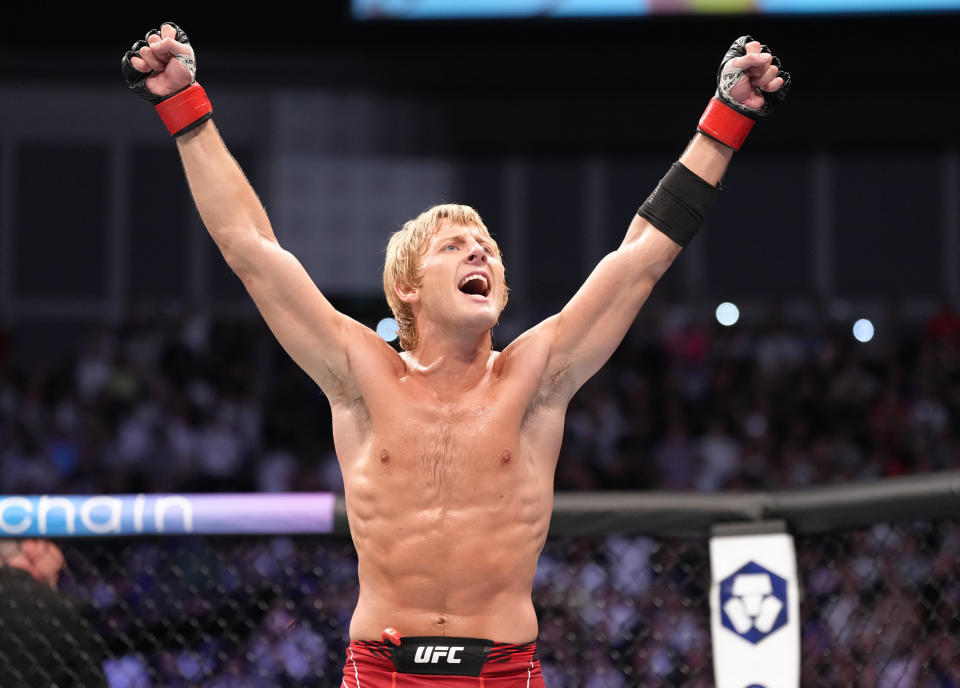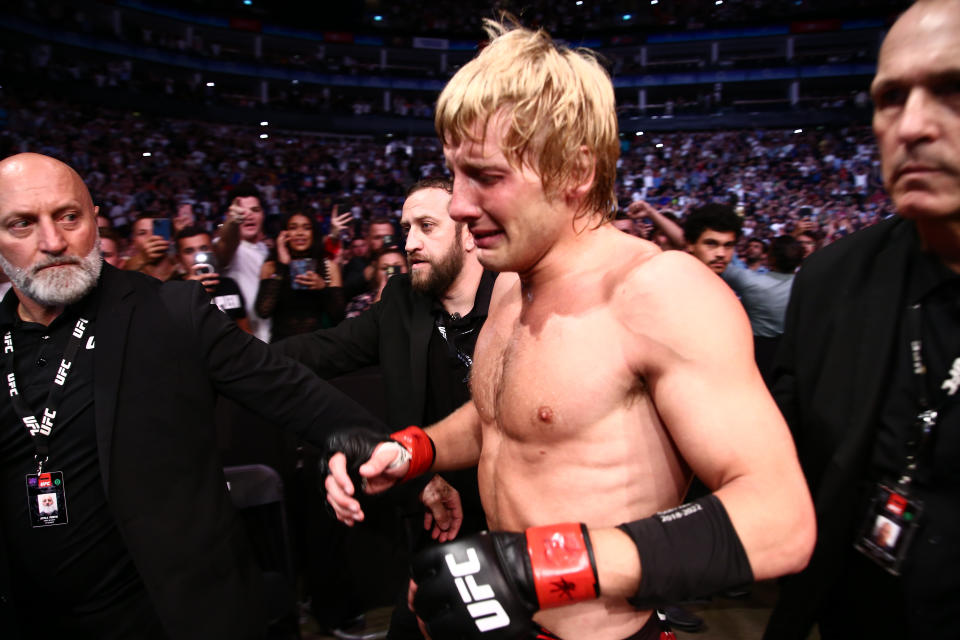Only moments after he submitted Jordan Leavitt for his third UFC win, and finish, in as many tries, Paddy Pimblett walked to the center of the Octagon to speak to the delirious crowd that jammed London’s O2 Arena, his heart pounding, his mind racing.
Two days earlier, his friend, Ricky, took his own life, and Pimblett knew he had to do something.
And so, Pimblett did what he felt was right when he was interviewed by UFC Hall of Famer and broadcast analyst Michael Bisping. He spoke from the heart and didn’t hide his emotions. It was a remarkable, gut-wrenching speech, hearing this young man talk of a life needlessly lost and the need to take mental health issues seriously.
If that were it, it would have been a huge win. But it wasn’t, and even more good has come of Pimblett’s off-the-cuff speech.
“To be honest, everything blew up on on media after I said it, and my social media and stuff went absolutely bananas,” said Pimblett, who on Saturday will face Jared Gordon in the co-main event of UFC 282 at T-Mobile Arena in Las Vegas. “But it’s the messages that I got off people saying, ‘Oh, cause you said that, I’ve reached out to someone and spoke. I haven’t— I haven’t tried to commit suicide because of what you said.’ Like, stuff like that, it means more to me than any— winning any fight ever will.”
“Paddy the Baddy” is a colorful and often outrageous character on social media, and he has the kind of style in which he’ll say anything to anyone at any time. It’s why he has 2.3 million followers on Instagram and has become one of the UFC’s most bankable stars heading into the fight Saturday.
He’s going to continue to speak out on mental health issues. He just created “The Baddy Foundation” to help feed hungry children and to assist those struggling with mental health.
Gordon, too, has taken a very public stance trying to assist those in desperate shape. Gordon once was a drug abuser whose heart stopped briefly before it was resuscitated. He spends a great deal of his free time trying to help people on the edge to overcome their addictions and their issues and return productively to society.
Hearing a stranger say you helped save their life because of something you said has to be an incredible feeling, and it’s what motivates Pimblett to keep going.


“Jared’s got such an inspirational story, to be honest,” Pimblett said. “I respect him so much as a human being. He’s a brilliant man. Beaten through, coming through his addiction, what he’s come through. And he was legally dead for two minutes as well, wasn’t he? And then he came back to life. So it just shows you, he’s got a purpose being here. And I think his purpose is to help former addicts, and to obviously help people as well, with mental health issues. That’s one of the reasons I’m here, know what I mean? And like, I never thought I’d be making a speech like that after a fight. If that didn’t happen with Ricky two nights before it, then I wouldn’t have.
“But it’s one of them things. Like, I mean, I said that and it came from the heart. It’s just sort of that I was passionate about it as soon as I heard about it. Because obviously, it’s so big in the UK, as well. But in Liverpool, especially, over the past couple of months, there’s been multiple people kill themselves in my city, about my age. It’s the biggest killer of men between 18 and 50. And no one speaks about it enough. And that’s why I just thought I should speak about it. And I’m going to continue to speak about it, right up until I have no breath left in me.”
The bully pulpit will get bigger for Pimblett as long as he keeps winning. He was elevated to the co-main event on Nov. 23, when the main event between then-light heavyweight champion Jiri Prochazka and former champion Glover Teixeira fell out because of an injury to Prochazka. The UFC elevated the co-main event between Jan Blachowicz and Magomed Ankalaev to the main event and made it for the vacant title because Prochazka vacated it knowing he’d be out for a year or so and didn’t want to hold up the division.
The co-main always gets a lot of attention on UFC cards, but Pimblett insisted it was no big deal. He thrives on moments like this, when the world is watching and the pressure is on.
“I was the people’s main event, anyway,” Pimblett said. “You know that. I was what most people were buying the pay-per-view for and buying tickets to come and watch the show for. I’m the one that puts the bums on seats. That’s basically it. The UFC knows my star power. And that’s just the way it is. It’s like, I’ve got more followers on Instagram than Bryce Mitchell, Ankalaev, Jan Blachowicz, and Jared Gordon, put together.”
He’s still developing as a fighter, though he dreams big as all stars should. He speaks of fighting ex-featherweight and lightweight champion Conor McGregor one day in a bout he predicts will set a UFC record for PPV sales should it happen.
He’s got to get past Gordon first, though that’s no easy task. But Pimblett is as confident and self-assured as he is compassionate and, after taking a while to praise Gordon, says bluntly, “I think I’m better than him in every way.”
If he proves it, he’ll be 4-0 in the UFC and would enter 2023 with significant momentum. He’s in no rush, he said, but will fight whomever the UFC matchmakers believe will make the best and most entertaining fights for him.
“I don’t care whose name is on that contract,” Pimblett said. “It doesn’t matter if the champ’s name’s on there, or someone you’ve never heard of name’s on there. It doesn’t make a difference to me. I just signed the contract that I get given, and [I’ll fight anyone].”
All the while, he’ll be fighting for those who can’t fight for themselves. And that makes him a champion long before he ever gets to fight for the belt.


